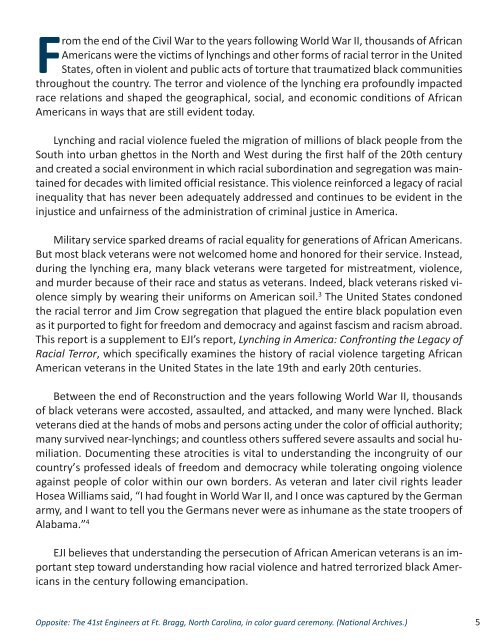You also want an ePaper? Increase the reach of your titles
YUMPU automatically turns print PDFs into web optimized ePapers that Google loves.
From the end of the Civil War to the years follow<strong>in</strong>g World War II, thousands of African<br />
<strong>America</strong>ns were the victims of lynch<strong>in</strong>gs and other forms of racial terror <strong>in</strong> the United<br />
States, often <strong>in</strong> violent and public acts of torture that traumatized black communities<br />
throughout the country. The terror and violence of the lynch<strong>in</strong>g era profoundly impacted<br />
race relations and shaped the geographical, social, and economic conditions of African<br />
<strong>America</strong>ns <strong>in</strong> ways that are still evident today.<br />
<strong>Lynch<strong>in</strong>g</strong> and racial violence fueled the migration of millions of black people from the<br />
South <strong>in</strong>to urban ghettos <strong>in</strong> the North and West dur<strong>in</strong>g the first half of the 20th century<br />
and created a social environment <strong>in</strong> which racial subord<strong>in</strong>ation and segregation was ma<strong>in</strong>ta<strong>in</strong>ed<br />
for decades with limited official resistance. This violence re<strong>in</strong>forced a legacy of racial<br />
<strong>in</strong>equality that has never been adequately addressed and cont<strong>in</strong>ues to be evident <strong>in</strong> the<br />
<strong>in</strong>justice and unfairness of the adm<strong>in</strong>istration of crim<strong>in</strong>al justice <strong>in</strong> <strong>America</strong>.<br />
Military service sparked dreams of racial equality for generations of African <strong>America</strong>ns.<br />
But most black veterans were not welcomed home and honored for their service. Instead,<br />
dur<strong>in</strong>g the lynch<strong>in</strong>g era, many black veterans were targeted for mistreatment, violence,<br />
and murder because of their race and status as veterans. Indeed, black veterans risked violence<br />
simply by wear<strong>in</strong>g their uniforms on <strong>America</strong>n soil. 3 The United States condoned<br />
the racial terror and Jim Crow segregation that plagued the entire black population even<br />
as it purported to fight for freedom and democracy and aga<strong>in</strong>st fascism and racism abroad.<br />
This report is a supplement to EJI’s report, <strong>Lynch<strong>in</strong>g</strong> <strong>in</strong> <strong>America</strong>: Confront<strong>in</strong>g the Legacy of<br />
Racial Terror, which specifically exam<strong>in</strong>es the history of racial violence target<strong>in</strong>g African<br />
<strong>America</strong>n veterans <strong>in</strong> the United States <strong>in</strong> the late 19th and early 20th centuries.<br />
Between the end of Reconstruction and the years follow<strong>in</strong>g World War II, thousands<br />
of black veterans were accosted, assaulted, and attacked, and many were lynched. Black<br />
veterans died at the hands of mobs and persons act<strong>in</strong>g under the color of official authority;<br />
many survived near-lynch<strong>in</strong>gs; and countless others suffered severe assaults and social humiliation.<br />
Document<strong>in</strong>g these atrocities is vital to understand<strong>in</strong>g the <strong>in</strong>congruity of our<br />
country’s professed ideals of freedom and democracy while tolerat<strong>in</strong>g ongo<strong>in</strong>g violence<br />
aga<strong>in</strong>st people of color with<strong>in</strong> our own borders. As veteran and later civil rights leader<br />
Hosea Williams said, “I had fought <strong>in</strong> World War II, and I once was captured by the German<br />
army, and I want to tell you the Germans never were as <strong>in</strong>humane as the state troopers of<br />
Alabama.” 4<br />
EJI believes that understand<strong>in</strong>g the persecution of African <strong>America</strong>n veterans is an important<br />
step toward understand<strong>in</strong>g how racial violence and hatred terrorized black <strong>America</strong>ns<br />
<strong>in</strong> the century follow<strong>in</strong>g emancipation.<br />
Opposite: The 41st Eng<strong>in</strong>eers at Ft. Bragg, North Carol<strong>in</strong>a, <strong>in</strong> color guard ceremony. (National Archives.) 5


